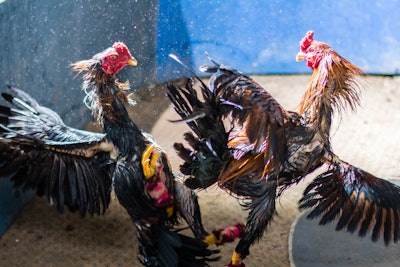
While highly pathogenic avian influenza (HPAI) is the primary disease U.S. poultry producers are concerning themselves with now, it wasn’t that long ago that a lot of attention was being given to virulent Newcastle Disease (vND).
The main carriers of vND in 2018-2020 were what the United States Department of Agriculture (USDA) politely referred to as backyard exhibition chickens, but those birds were really roosters used for cockfighting.
The reported cases of vND eventually stopped, but not before at least three commercial poultry operations were hit by vND.
While it was good to see those reported cases stop, it does raise concerns about what other diseases these birds can spread, and with the HPAI outbreak still going strong in the United States, the last thing that is needed is cockfights that feature birds that may not get routine veterinary care.
Last week, I received a press release via email that said bipartisan legislation was introduced in the U.S. House of Representatives that included proposed amendments to Section 26 of the Animal Welfare Act, that would reportedly include:
- banning simulcasting and gambling on animal fights in the United States, no matter where the fights and broadcasts originate;
- halting the shipment of mature roosters shipped through the U.S. mail;
- creating a citizen suit provision to allow private right of action against illegal animal fighters and ease the resource burden on federal agencies; and
- enhancing forfeiture provisions to include real property used in the commission of an animal fighting crime.
That all sounds well and good, and I want dogfighting and cockfighting come to an end in the United States, but I still am a little apprehensive about this.
Here is the list of the representatives behind the provisions: Reps. Cindy Axne, D-Iowa, and Don Bacon, R-Neb., Mark Amodei, R-Nev., Troy Carter, D-La., Buddy Carter, R-Ga., Brian Fitzpatrick, R-Pa., Nancy Mace, R-S.C., Jim McGovern, D-Mass., and Mike Quigley, D-Ill.
Only one agriculture committee member is listed, and that is Axne, who is serving as a lame duck after not surviving a re-election attempt.
But a quote from Axne, despite her limited future in Washington, was concerning: “As a lifelong animal rights activist, I will continue working to ensure animals are treated with the dignity and respect they deserve.”
Anytime anyone in Congress refers to themselves as an animal rights activist and that person is able to get others to join them, it gets me a little nervous. I’m equally concerned with the lack of familiar names of elected officials who have a firm understanding of animal agriculture.
I haven’t read the text of the bill yet, so it may just be these animal fighting concerns on their minds, but those three key words from Axne, combined with the fact that the same release had a quote from former Humane Society of the United States CEO Wayne Pacelle, who now heads up another animal rights organization, Animal Wellness Action, make me not so quick to dismiss what is going on.
Maybe I’m overreacting, but the way I see it, a connection has been made between Pacelle and members of Congress, so you never know what may come next.

















